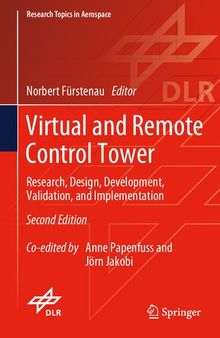 جزییات کتاب
جزییات کتاب
This book presents the interdisciplinary and international “Virtual and Remote Tower” research and development work. It has been carried out since nearly twenty years with the goal of replacing the conventional aerodrome control tower by a new “Remote Tower Operation” (RTO) work environment for enhancing work efficiency and safety and reducing cost. The revolutionary human–system interface replaces the out-of-windows view by an augmented vision video panorama that allows for remote aerodrome traffic control without a physical tower building. It enables the establishment of a (multiple) remote control center (MRTO, RTC) that may serve several airports from a central location. The first (2016) edition of this book covered all aspects from preconditions over basic research and prototype development to initial validation experiments with field testing. Co-edited and -authored by DLR RTO-team members Dr. Anne Papenfuss and Jörn Jakobi, this second extended edition with nearly doubled number of chapters includes further important aspects of the international follow-up work towards the RTO-deployment. Focus of the extension with new contributions from ENRI/Japan and IAA/Dublin with Cranfield University, is on MRTO, workload, implementation, and standardization. Specifically, the two revised and nine new Chapters put the focus on inclusion of augmented vision and virtual reality technologies, human-in-the-loop simulation for quantifying workload and deriving minimum (technical) requirements according to standards of the European Organization for Civil Aviation Equipment (EUROCAE), and MRTO implementation and certification. Basics of optical / video design, workload measures, and advanced psychophysical data analysis are presented in four appendices.



 دانلود کتاب
دانلود کتاب

 جزییات کتاب
جزییات کتاب





 این کتاب رو مطالعه کردید؟ نظر شما چیست؟
این کتاب رو مطالعه کردید؟ نظر شما چیست؟
